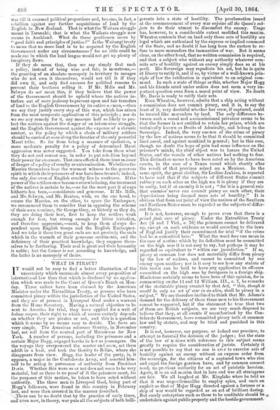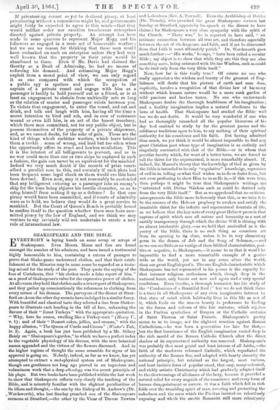WHAT IS PIRACY?
T would not be easy to find a better illustration of the uncertainty which surrounds almost every proposition of international law than that which, is disclosed by an applica- tion which was made to the Court of Queen's Bench on Mon- day. Three sailors have been claimed by the American Minister under the Extradition Treaty, as persons who have committed piracy within the jurisdiction of the United States, and they are at present in Liverpool Gaol under a warrant from the Home Secretary. Ravine a natural objection to be sent to America for trial, they have applied for a writ of habeas corpus, their right to which of course entirely depends on whether they are pirates or not, and this is a question which it seems by no means easy to decide. The facts are very simple. The American schooner Gerrity, in November last, set sail from the neutral port of Matameras for New York. A number of persons, including the prisoners and a certain Major Hogg, engaged berths iii her as passengers. On the voyage they overpowered the master and crew, set them adrift in a boat, and took the Gerrity to Belize, where she disappears front view. Hogg, the leader of the party, is, it appears, a major in the Confederate Army, and asserted him- self to be acting in pursuance of authority from President Davis. Whether this were so or not does not seem to be very material, but as there is no proof of it the prisoners must, for the purposes of this motion, be taken to have acted without authority. The three men in Liverpool Gaol, being part of Hogg's followers, were found in this country in February last, and were then arrested in the manner described. N. There can be no doubt- that by the practice of early times, ven now, in theory, war puts all the subjects of both belli-
all
gerents into a state of hostility. The proclamation issued at the commencement of every war enjoins all the Queen's sub- jects to do their utmost to discomfort the enemy. Usage has, however, to a considerable extent modified this maxim. Wheaton contends that on land only those acts of hostility are legal which are authorized by the express or implied command of the State, and no doubt it has long been the custom to re- fuse to mere marauders the immunities of war. But it seems clear, on the other hand, that no written commission is required, and that a subject who without any authority whatever com- mits acts of hostility against an enemy simply does so at his peril. His Sovereign may repudiate his act, but he is quite at liberty to ratify it, and if so, by virtue of a well-known prin- ciple of law the ratification is equivalent to an original com- mand. In such a state of things as this, whether Major Hogg and his friends acted under orders does not seem a very im- portant question even from a moral point of view. No doubt Mr. Davis is ready to ratify their acts.
Even Wheaton, however, admits that a ship acting without a commission does not commit piracy, and it is, to say the least of it, very doubtful whether her crew, if captured, could be treated like marauders by land. The only difference be- tween such a vessel and a commissioned privateer seems to be that the former is not entitled to retain her prizes, which are technically known as Droits of Admiralty, and belong to the Sovereign. Indeed, the very essence of the crime of piracy by the law of nations seems to be that it should be committed lueri music, and against mankind in general; but in this case, thought no doubt the hope of gain had some influence on the prisoner's minds, the chief object was to harass the 'United States, and the vessels of other nations had nothing to fear. This distinction seems to have been acted on by the American courts, in the case of a Texan vessel which shortly after the revolt of that province seized on a Mexican. In the same spirit, the great civilian, Sir Leoline Jenkins, is reported to have said that if the subjects of different States commit robbery on each other on the high sea it is piracy if they are in amity, but if at enemity it is not ; "for it is a general rule that enemies never can commit piracy on each other, their depredations being deemed mere acts of hostility." It is obvious that from our point of view the natives of the Southern and Northern States must be regarded as the subjects of differ- ent States.
It is not, however, enough to prove even that there is a prim facie ease of piracy. Under the Extradition Treaty Act (6 and 7 Viet., c. 76) the prisoners cannot be delivered up, except on such evidence as would according to the laws of England justify their commitment for trial "if the crime had ben committed here." What the word here can mean in the case of a crime, which by its definition must be committed on the high seas it is not easy to say, but perhaps it may be regarded as equivalent to "within our jurisdiction." If so, piracy at common law does not materially differ from piracy by the law of nations, and cannot be committed by one enemy upon another; nor is it easy to see how any statute of this realm can be held to have any application to offences committed on the high seas by foreigners in a foreign ship. Blackstone certainly seems to have been of this opinion, for in commenting on the 11 and 12 William. III., c. 7, he remarks of the statutable piracy created by that Act, " this, though it would be only an act of war in an alien, shall be piracy in a subject." We are therefore inclined to think that Mr. Adams's demand for the delivery of these three men to his Government cannot be supported, but if the statement be true that two of them are British subjects, we are very much disposed to believe that they, at all events if unauthorized by the Con- federate Government, have committed piracy both at common law and by statute, and may be tried and punished in this country. It is not, however, our purpose, or indeed our province, to attempt to forestall the decision of the judges ; but the state of the law of n Itions with reference to this subject seems greatly to require the consideration of jurists. Certainly it is not possible to say that no one is evi r to exercise acts of hostility against an enemy without an express order from the sovereign, for the citizens of a captured town who rise and expel the foreign garrison have, and by common consent need, no previous authority for an act of patriotic heroism. Again, it is an old maxim that in love and war all stratagems are fair. We all laughed at Mr. Singlake when he told us that it was ungentlemanlike to employ spies, and such an exploit as that of Major Hogg directed against a fortress or a ship of war would be regarded as an act of brilliant daring. But surely enterprises such as these to be creditable should be • undertaken against public property and the hostile government. If privateering cannot as yet be declared piracy, at least privateering without a commission might be, and governments might fairly be expected to agree to this much—that they would neither order nor sanction treacherous enterprises directed against private property. An attempt has bean made in some quarters to represent Major Hogg and his followers as engaged in a mere act of honourable warfare ; but we see no reason" for thinking that these men would have embarked on such an enterprise unless they had very well known that the property in their prize would be abandoned to them. Even if Mr. Davis had claimed the Gerrity as a Droit of Admiralty, he had no means of enforcing his demand. And estimating Major Hogg's exploit from a moral point of view, we can only regard it as one compared with which the occupation of a public spy is spotless and pure. To go to the captain of a private vessel and engage with him as a passenger is tacitly to hold yourself out as a friend, or is at least an engagement to abstain from unfriendly acts so long as the relation of master and passenger exists between you. To violate that engagement, to enter the vessel, and eat and drink, and talk and laugh with him, having all the time a secret intention to bind and rob, and in case of resistance wound or even kill him, is an act of the basest treachery, which these men committed, not for any public object, but to possess themselves of the property of a private shipowner, and, as we cannot doubt, for the sake of gain. These are the kind of things which embitter warfare, which leave behind them a rankli. .. sense of wrong, and lead but too often when the opportunity offers to cruel and lawless retaliation. This it is the interest of all belligerents to prevent, and as in no war could more than one or two ships be captured in such a fashion, the gain can never be an equivalent for the mischief. Indeed we very much doubt if the records of prize courts afford a parallel case to this, and certainly if such plots had been frequent some legal cheek on them would ere this have been devised. Even now, may it not reasonably be contended that any belligerent entering as a passenger into an enemy's ship for the time being abjures his hostile character, so as to estop himself from setting it up as a defence ? In that case piracy would have been committed, and if courts of admiralty were so to hold, we believe they would do a great service to mankind. But the Court of Queen's Bench is probably bound to confine itself to the question whether these men have com- mitted piracy by the law of England, and we think we may venture to say certainly will not undertake to create a new rule of international law.



































 Previous page
Previous page